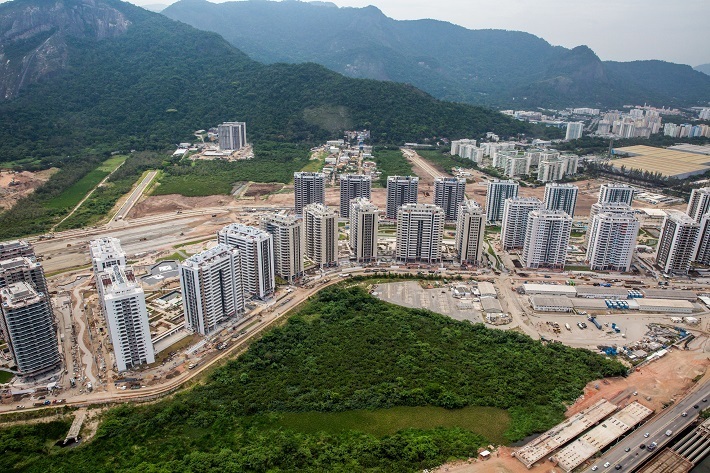Along with early issues of worker strikes and delayed construction, paired with the ongoing pollution concerns surrounding its open water venues, the city of Rio de Janeiro has been continually plagued by budget problems along its journey to hosting the 2016 Olympic Games.
Last October we reported how, amid a severe economic crisis plaguing the country of Brazil, Rio 2016 Olympic Game organizers met in a series of “crises meetings” to identify cost-cutting measures in an effort to reduce the massive event’s overall budget. Economy shrinkage and inflation increase data resulted in Rio organizers reducing its Opening Ceremonies to be just 10% of the amount sped on the same celebration at the 2012 London Olympics.
As of that October report, Rio 2016 organizers said they would be reducing its estimated £2.38 billion ($3.6 billion/€3.2 billion) budget by as much as 30%, with infrastructure and volunteers being the most impacted. The overall budget for hosting the Games is established via a combination of IOC contribution, marketing deals, ticket sales and local sponsorship agreements. A separate capital budget uses a mix of public and private money for venue construction and other facilities, including roads.
With the local currency and inflation concerns still ever-present, as well as a corruption scandal involving the state-run oil company Petrobas leading to Brazilian President impeachment proceedings, cost-cutting measures of the Olympic Games is at the forefront again this month.
Rio organizers have told the press that most of the latest cost-cutting measures are invisible to the general public and ticket-paying customers and include a reduction in signage and the use of temporary structures, as examples.
However, the AP is reporting it may not just be internal workings of the international production that will see the most significant impact of the cost-measures after all. Approximately 10,500 athletes expected to compete at next year’s Olympics will be without air conditioning, unless the athletes’ federations pay for the luxury feature. The elimination of air conditioning is one of the routes to be taken in trimming the fat off the Rio budget.
“We are discussing with our partners, especially the IOC, what kind of levels of service we can reduce,” Mario Andrada, spokesman for the Rio Games said. “[The cutting] hasn’t been painful so far. It will be painful from now on because we need to finish the process.”
Andrada opined that, “As long as we don’t compromise the games, the quality of the competitions, the experience of the public — then we have to look for efficiencies.” Some athletes and coaching staff members who may be unable to afford air-conditioning may end up disagreeing with Andrada, as temperatures have been known to creep into the mid-90s, even in August. Yet, Andrada stated, “we don’t think it’s going to be critical [to have air conditioning] there.”
Another issue discussed during this same press conference was the fact that Rio organizers have yet to sign a contract with a private energy supplier, meaning the Games are without electricity at this point in time. Temporary generators would have to be used as the “B Plan”, as Andrada is quoted as saying “the responsibility to provide energy belonged to the national government.”
Trying to reassure athletes, spectators and Brazilian constituents, Andrada stated, “We do have a concrete plan. The plan is being executed but we haven’t got the final solution for the problem.”
“This is a problem that should have been fixed a while ago,” he said. “We will have energy. Don’t get scared.”

Giving the games to Rio was a monumental mistake! The country can’t care for it’s own needs with rampant crime, poverty and pollution. What was the IOC thinking!
Hmmm. I wonder how long it is before we hear that indoor plumbing is considered a luxury?
Each national team member will receive a portable generator to take with them on their trip to Rio!!! That’s the only way to guarantee electricity. I wonder if they are installing adequate AC units for all those residential towers. skimping on the units is the only way to save any significant amount of money. Its winter there in August and the AC probably is not needed anywhere close to 24/7. I am guessing about $100 max for two weeks AC for a small apartment…actually that sounds high.
They also announced they aren’t installing TVs in the bedrooms and that makes me wonder about what the WIFI will be like…some little D-link router for every 5 or 6 floors. That’s… Read more »
Actually, it will still probably be in the 90s during the peak of the day there regardless of it is winter. Brazil is almost entirely above the tropic of Capricorn line. Rio is roughly around 20 degrees latitude in the southern hemisphere. To compare, San Diego is about at 32-33 lat. and Miami is about 26 lat. So it will most likely be warmer than those places in January. Also, this year in August it did get up to 37 C which is about 98F in Rio. On average this year in August it was about 29C which is about 84-85F.
And don’t forget about the humidity. I can’t imagine what some of the poorer countries athletes will do.
Good thing we increased our annual dues, we’ve got the money to cover the Brazilian government and pay for AC for the NT during the games.
This is absolutely madness. US swimmers are use to air conditioning. This olympics is going to be very ghetto.
Correct me if I’m wrong, but isn’t the pool going to be opened air or are you referring to something else?